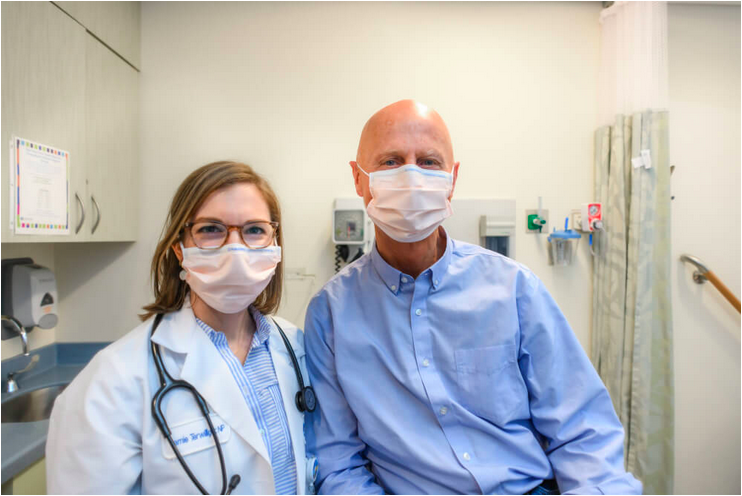
*The following article was published by Dana Farber Cancer Institute*
When John Ferris was first diagnosed with follicular lymphoma in early 2017, he was told he had six to nine months to live. Later, while undergoing treatment that appeared to be halting his cancer, he received an amended diagnosis.
“Cancer is not going to kill you, but your drinking could,” his oncologist told Ferris. “We want to help.”
Ferris, 65, credits the doctor who delivered that edict — Philippe Armand, MD, PhD, of Dana-Farber Brigham Cancer Center — for saving his life in two ways. Armand’s team in the Lymphoma Program were able to halt Ferris’ lymphoma through his inclusion on a clinical trial, while simultaneously helping him through an additional challenge: alcoholism.
Learning he had a serious cancer led Ferris to start drinking again after nearly 18 years of sobriety, and the kindness and patience that Armand, nurse practitioner nurse practitioners Katherine (Katey) Stephans, NP, and Jamie Terwilliger, NP, and other clinicians displayed during Ferris’ lymphoma treatment and his concurrent stint in an alcohol rehabilitation program enabled him to make it through both and into long-term remission.
“They were wonderful,” says Ferris, a retired financial executive and school administrator. “If I missed a treatment because of rehab, Dr. Armand always says, ‘It’s more important that you focus on your sobriety. We’ll figure out the cancer piece.’”
Extra Effort
Ferris, a longtime New Hampshire resident, was looking ahead to a retirement of hiking, biking, and traveling with his wife of 41 years, Valerie, when he began feeling a numbness and tingling in his hands and feet in late 2016. His primary care physician diagnosed him with sciatica, and prescribed physical therapy sessions. When these didn’t work, Ferris was instructed to get an MRI at a local hospital in February 2017.
“The next morning, I learned I had stage-four lymphoma,” says Ferris. “The doctors told me all they could do was make me comfortable for the time I had left. That’s when I started drinking again.”
In the midst of this dual setback, a friend’s referral led Ferris to Dana-Farber Brigham Cancer Center. Upon meeting Armand, his spirts were immediately boosted.
“Dr. Armand said, ‘I’m not going to talk to you about how long you have to live, I’m going to talk to you about a cure,’” recalls Ferris. “That was the first time since my diagnosis that I actually felt some hope.”
A standard chemotherapy regimen put Ferris’ lymphoma into remission, but it soon came back. After a second treatment, remission, and relapse, Armand started Ferris in 2019 on a clinical trial that he is leading at Dana-Farber Brigham Cancer Center. The study uses a recently developed type of drugs called bispecific antibodies, synthetic proteins that can bind to two different targets. In this case one bispecific antibody binds on cancer cells, and one attaches to the patient’s own T cells (a type of immune cell) — forcing the T cells to attack the cancer cells.
“This is a very promising new class of drugs which can provide an effective treatment for patients like Ferris with B-cell lymphomas” says Armand, chief of the Division of Lymphoma at Dana-Farber Brigham. “We are excited and honored to pursue research with these drugs and hope that they can benefit many more patients in the future.”
Armand and his team went to great lengths to make Ferris’ inclusion on the trial work. When Ferris was in an alcohol rehabilitation facility on Cape Cod, they helped arrange for a driver to take him to and from Boston for appointments; when he fell due to his drinking, and suffered a large gash on his head, his treatments were put on temporary hold and then rearranged by Stephans.
“Cancer is a reluctant journey, and in so many ways addiction is as well,” says Stephans. “As caregivers we are fortunate that our patients entrust us to guide them on this reluctant journey in whatever direction it goes. His journey had the added complexity of addiction, and we remained steadfast in our commitment to be there for he and his family.”
The measures worked, and Ferris was one of the first patients to go into complete remission on the trial. He has remained cancer-free since December 2020.
“My last drink was when Dr Armand told me that my cancer was back in remission,” Ferris says.
Sharing his story
These days, Ferris is feeling great and enjoying the active retirement he envisioned before cancer. He lives with Valerie and their adult son, Tuckerman — named for the ravine on Mount Washington in New Hampshire that is a favorite hiking spot for the family. Valerie was treated for breast cancer at Dana-Farber Brigham Cancer Center more than a decade before her husband, and the couple is savoring their dual survivorship. They hope to spend much of it at their cottage in Downeast Maine, which has been in the Ferris’ family since the 1940s.
And although he has remained sober, Ferris knows to never take this condition for granted. Accordingly, he wants to let other cancer patients and families dealing with addiction know that it’s possible to endure anything with the right team supporting you.
“Part of what I do in my recovery is try to give back to other people,” says Ferris. “One way to do that — maybe the best way — is to share our stories. Recovering from alcoholism and getting sober was a big part of what Dana-Farber helped me through.”
